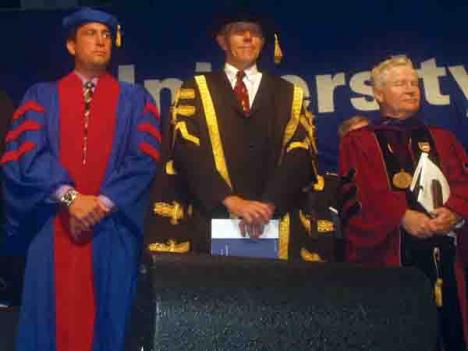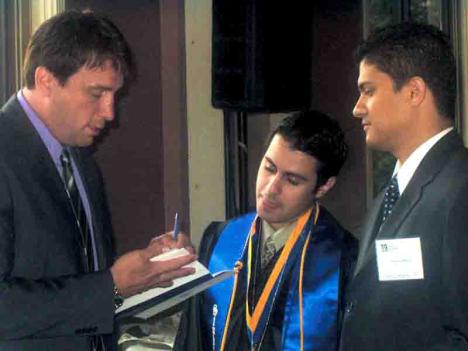$1,000 Fee Hike
March 28, 2003
In a dramatic increase, undergraduate and graduate fees will be raised $500 a semester, totaling $1,000 a year, effective this coming fall. Undergraduate and graduate fees for out-of-staters will total $2,000, an increase of $1,000 a semester. Fees have been raised an average of 4.7% a year for the past eight years, with no increases in 1996, 1997, and 1998.
The UMass Board of Trustees voted for the increases on Wednesday, March 12, as many students were preparing to leave for spring break the next week. The increase is expected to bring in around $40 million annually in revenue, and is an effort to stop some of the bleeding that a planned $65 million dollar cut from UMass’ $480 million budget would cause.
Before the vote, UMass President William Bulger briefly criticized Governor Mitt Romney’s plan for reorganizing higher education. In a tone more subdued than that of his appearance at a House Ways and Means Committee meeting in Bridgewater days before, but with words no less sharp, Bulger stated the plan would do more harm than good to universities and colleges, by dividing colleges into regions, privatizing Worcester, and downgrading the research missions of UMass Boston. The plan would also reduce state scholarships, and set up a new and more complicated bureaucracy, he charged, in which there would be a board of trustees for each school and a voluntary council each region, and a new Executive Office of Education, which would answer to the governor. The plan also eliminates Bulger’s 5.6 million dollar President’s Office.
With the war abroad still in its early stages, the local media played up the angle of an ongoing war between Bulger and Governor Romney. Trustee and Chairwoman Grace Fey took the media to task over it, saying, “I don’t see a battle between two individuals,” calling it instead a “clash of ideas.”
Bulger told the Board of Trustees that his office is in daily contact with the legislature, and will be meeting with as many legislators as possible. Bulger already has the support of Representative and Vice Chairman of Ways and Means Peter Larkin, showing a letter from Rep. Larkin to his fellow representatives, in which Larkin charged Romney’s plans do not have “the planning and multi-dimensional focus of Governor Weld’s reorganization,” and accused it of focusing only on the “bottom line.”
“Governor Weld’s reorganization pushed UMass to become a major economic engine for growth in the state,” Larkin wrote. “The University’s 4,500 faculty members and 14,000 total employees attract and utilize $250 million in research funds, making UMass one of the state’s most powerful economic generators and largest employers.”
Assorted UMass alumni presidents, in a statement dated March 10, also expressed support for Bulger, stating that the UMass system is a “critical base from which to move forward during the 21st century” and that “[d]ismantling the University of Massachusetts would be taking a significant step back in time.”
UMass Amherst Student Trustee Bill Powers cast the lone “no” vote, saying that a thousand dollars is still a lot of money to many students and something which should be spread out over several years. Two out of the five student trustees have voting rights, which rotate every year between the campuses. This year, the Amherst and Worcester campuses have the vote, with UMass Boston to be handed it next. Amherst -which would be spun off on its own-seems to be cautiously supportive of the Romney plan, having endorsed it in a 31-10 resolution the same week the Board of Trustees met.
UMass Boston Student Trustee Heather Dawood says that had she had the vote, it would have been a “yes” to the increases.
“I hope we realize that system-wide we have to protect our research programs and our shared resources,” she said. Citing a need to provide dialogue and importance in defending public higher education, the UMass system, and UMass Boston, Trustee Dawood is spearheading Public Higher Education Made Personal (PHEMP), a letter-writing campaign to state legislators to let them know of the “wonderful programs we have.” She and others will be manning stations at the McCormack, Wheatley, and Quinn Buildings April 7 through 10 to “tell our stories to legislators” to “make it personal.” Students, staff, and faculty are invited and encouraged to participate.
The increase of fees is another sign of difficult times for the university, even with a new campus center and dorms on the way. But without them, UMass officials state things would be on the road to becoming far worse.
“Without increasing student fees, we would have been forced to close at least one college and lay off hundreds of employees,” wrote UMass Boston Chancellor Jo Ann Gora in a letter to parents and students. “I regret having to raise these fees, but stand committed to preserving our academic degree programs, course availability, small class size, and world-class undergraduate and graduate experience.”






















































